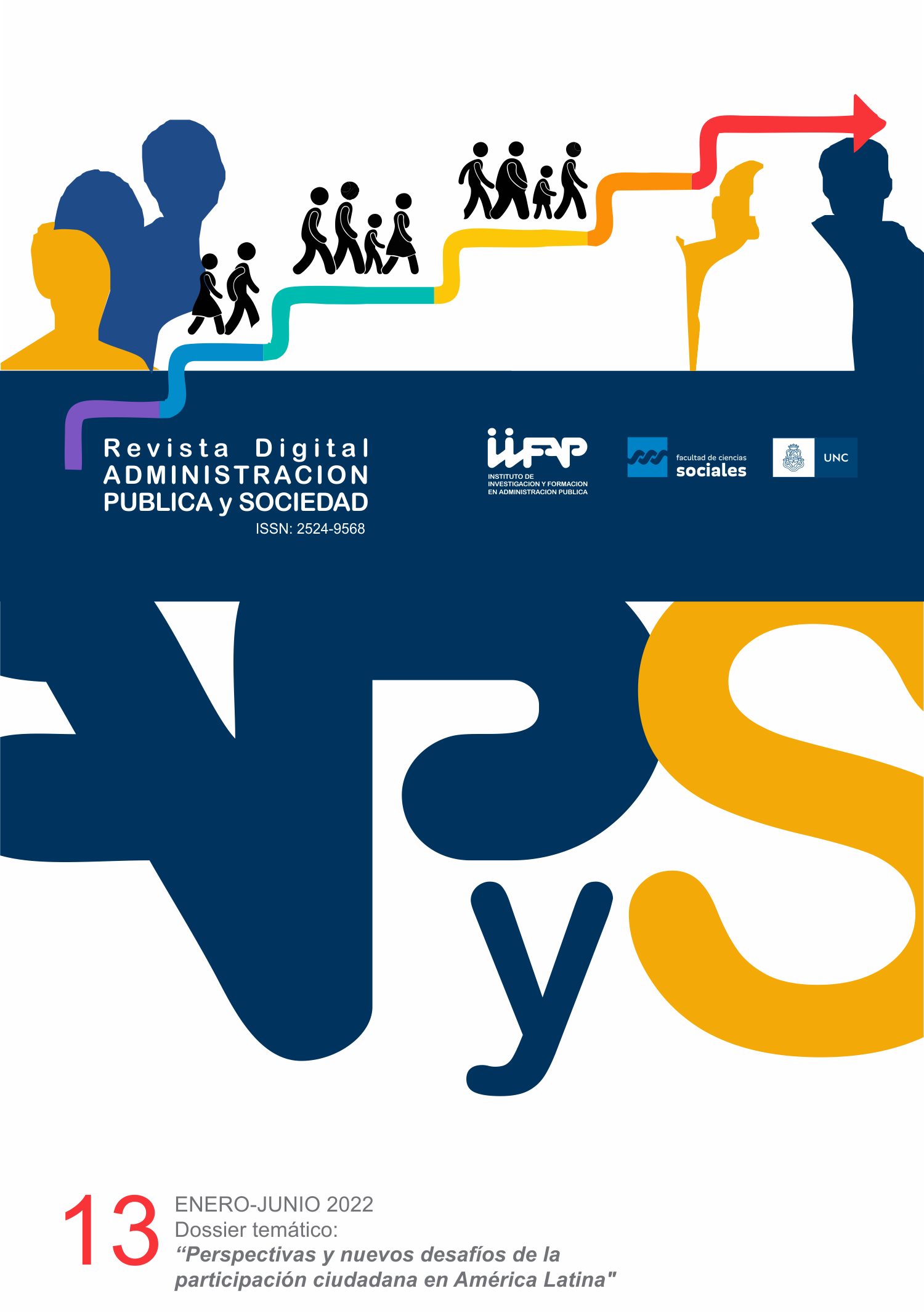Consensus and legitimacy in the legislative process of Cordoba’s territorial planning of native forests
Main Article Content
Abstract
In August 2010, the Legislature of Córdoba sanctions law 9814, a regulation whose aim is to protect the provincial native forests through a territorial planning, based on a set of criteria and categories that define different conservation areas. The legislative discursive field that results in this regulation is highly controversial, according to the provincial political scenario that configures it and the treatment given to the law in the Legislature of Córdoba. In the parliamentary process that takes place between 2008 and 2010, at least two proposals coexist and a fairly long work is carried out in commissions. Once the time has come for treatment on the legislative chamber, discussions between competing alternatives are certainly controversial and the resolution of the conflict is given by the interposition, at the last moment, of an official project (Unión por Córdoba). The level of controversy that characterizes this legislation case is privileged ground to analyze the discursive tactics and strategies in conflict, and in this article we concentrate on those that refer to one of the controversial dimensions of the debate: the discursive confrontation around the notions of consensus, legitimacy and legality of the approved text. By means of a discourse analysis of the stenographic version of the session in which this law is voted, we offer a characterization of the parliamentary process and the problematic nodes, to reflect on whether or not we are actually facing a political deliberation and what defines it precisely. If we consider that law 9814 awaits an update with real challenges for the Cordoba Parliament, this article may offer valuable insights for the next stages in environmental protection of the native forests of Córdoba.
Article Details

This work is licensed under a Creative Commons Attribution-NonCommercial-ShareAlike 4.0 International License.
Authors who publish in this journal accept the following terms of the copyright policy:
- Authors shall retain their copyright (including copyrights) and shall grant to the journal the right of first publication of their work, which shall simultaneously be subject to the Creative Commons Recognition License: No commercial use of the original work or any derivative works is permitted, distribution of which must be made under a license equal to that which governs the original work.
- Authors may adopt other non-exclusive license agreements for the distribution of the version of the published work (e.g., placing it in an institutional repository or publishing it in a book) provided that the initial publication in this journal is indicated.
- Authors are allowed and encouraged to disseminate their work through the Internet (e.g., in institutional repositories or on their website) after the publication process, which may lead to interesting exchanges and increased citations of the published work. (See The Effect of Open Access).
How to Cite
References
AVILA CASTRO, María Paula (2019) "'Una amenaza sin precedentes'. Problematización contemporánea de la cuestión de los bosques nativos en Córdoba y el país". Crítica Y Resistencias. Revista De Conflictos Sociales Latinoamericanos, 9, 70-89. Recuperado de: https://www.criticayresistencias.com.ar/revista/article/view/121
CEDHA (2009). “Consideraciones críticas acerca del anteproyecto de ordenamiento territorial del bosque nativo presentado por la Confederación de Asociaciones Rurales de la Tercera Zona (CARTEZ)”. Centro de Derechos Humanos y Ambiente. Recuperado de: https://center-hre.org/
DEON, Joaquín (2016). “¿Caminando hacia el movimiento contra el desmonte en Córdoba?” Cardinalis, 4(6), 63-90. Recuperado de: https://revistas.unc.edu.ar/index.php/cardi/article/view/14884
FOUCAULT, Michel (1988). “El sujeto y el poder”. Revista Mexicana de Sociología, 50(3), 3-20. https://www.jstor.org/stable/3540551
FOUCAULT, Michel (2015). Saber, historia y discurso. Buenos Aires: Prometeo.
FOUCAULT, Michel (2018). La Arqueología del saber. Buenos Aires: Siglo XXI Editores.
FOUCAULT, Michel (2019). Historia de la sexualidad. Tomo 1: La voluntad de saber. Buenos Aires: Siglo XXI Editores.
KOBERWEIN, Adrián (2018). “Ciencia, derecho, política y cultura en el conflicto por el bosque nativo en la provincia de Córdoba, Argentina”. Revista del Museo de Antropología, 11(1), 217-228. https://doi.org/10.31048/1852.4826.v11.n1.19917
ROSSI, Leonardo (2016). Córdoba respira lucha. El modelo agrario: resistencias y nuevos mundos posibles. Villa María: Eduvim.
NATANSON, José (2009). “Argentina: elecciones en tiempos de grieta”. Revista Nueva Sociedad, 281. Recuperado de: https://nuso.org/articulo/argentina-elecciones-grieta-macrismo-kirchnerismo/
SALIZZI, Esteban (2020). “Agronegocio, deforestación y disputas en torno al Ordenamiento Territorial de Bosques Nativos de la provincia de Córdoba (Argentina)”. Territorios, 43, 1-28. https://doi.org/10.12804/revistas.urosario.edu.co/territorios/a.7982
SCHNEIDER, Cristian, DE LUCA, Natalia y DASSANO, Melina (2018). Ley de bosques en Córdoba: el sentido de la participación ciudadana en políticas públicas. En FARN (Ed.) Informe Ambiental Anual 2018. (pp.313-332). Buenos Aires: Fundación Ambiente y Recursos Naturales (FARN). Recuperado de: https://farn.org.ar/wp-content/uploads/2020/06/2018_IAF.pdf
SILVETTI, Felicitas; SOTO, Gustavo; CÁCERES, Daniel y CABROL, Diego (2013). “¿Por qué la legislación no protege los bosques nativos de Argentina? Conflictos socioambientales y políticas públicas”. Mundo Agrario, 13(26), 1-21. https://www.mundoagrario.unlp.edu.ar/article/view/MAv13n26a05
URFALINO, Philippe (2013). Cerrar la deliberación. Buenos Aires: Prometeo.
VERA, Alejandro y GIMÉNEZ, Laura (2011). “Ley de bosques Córdoba”. Coalición Argentina para la Iniciativa de Acceso. The Access Initiative. Recuperado de: https://sites.google.com/site/leydebosquescordoba/home

